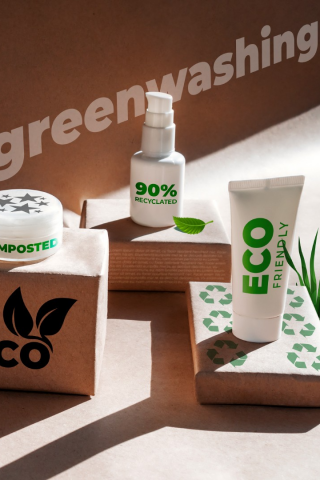Greenwashing in packaging
What is greenwashing in packaging, and what does it mean for market development? How can we identify the misuse of environmental claims? Let's take a closer look at the deceptive practices of some brands in recent years.

The pressure for environmental responsibility and social accountability is increasing. Many companies have genuinely embraced this issue, integrating "ecology" into their production, products, and packaging. However, not everyone approaches this topic honestly. Recently, products labeled as environmentally friendly, compostable, organic, eco, and green-friendly have appeared on the market, but not all of these claims are supported by reality. This infamous trend is known as greenwashing.
What is Greenwashing?
Greenwashing is a deceptive marketing strategy used by some companies to create a false impression of environmental responsibility. Consumers are led to believe that a product is more environmentally friendly than it actually is. Greenwashing in packaging can be presented in the form of misleading labels, symbols, or claims that suggest the packaging is eco-friendly, even when it is not.
Examples of Greenwashing in Packaging
Biodegradability
A typical example of greenwashing in packaging is the misuse of the term "biodegradable" or "compostable" without providing clear information on how or where the packaging can be "biologically disposed of."
Misleading Recyclability
Sometimes misleading or deceptive symbols are used to suggest that packaging is recyclable, even when it is not easily recyclable. A common example is artificially inflating the percentage of the recycled portion compared to the non-recyclable part.
Truth in Percentages
Another example is when brands claim to use recycled materials in their packaging without specifying the percentage of recycled content or whether the packaging can be recycled after use, or which parts of it can be.
Impact of Greenwashing
Companies are presenting their products as more sustainable than they truly are, misleading customers. Greenwashing deceives consumers while simultaneously undermining the genuine efforts of companies that are genuinely concerned about ecology and sustainability. A significant impact of false claims is the rise of consumer skepticism towards all eco-friendly marketing. This fact then makes it harder for truly sustainable products to stand out in the market," said Petr Hajda, Director of the Packaging Division at POINT CZ printing company.
The Future of Greenwashing
Companies do not realize that greenwashing can damage their reputation and lead to a loss of trust. Demands for environmental responsibility will continue to grow, and consumers will become more vigilant in their purchases. Companies will be forced to substantiate the truthfulness of their sustainability claims. By exposing greenwashing practices and fighting against them, we can build a market where truly sustainable packaging solutions thrive and contribute to a healthier planet for future generations.
We will help you with Eco-Friendly Packaging
Recyclable packaging solutions, eco-friendly materials, and responsible packaging production are topics we focus on at POINT CZ printing company. Our company is environmentally active, not only in recycling but also in responsible production and the use of alternative energy sources. We are firmly against greenwashing, support honest marketing, and help companies produce truly eco-friendly sustainable packaging.
Text: Markéta Švábová, Petr Hajda



 LinkedIn
LinkedIn